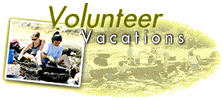
What's your idea of a perfect vacation? Seven straight days of
peace and quiet on a beach? Golf in the morning, followed by an afternoon
snooze in a hammock? Or are you the type who likes to keep busy on your
time off, maybe even learn a thing or two? If that's the case, then you
might consider going on an Earthwatch expedition. This non-profit
organization hooks up paying volunteers with scientists conducting research
in various far-flung corners of the globe for two weeks of intensive field
work. You don't have to have a scientific background to qualify...only a
sense of curiosity and adventure. The Savvy Traveler's Tom Verde fit that
description and recently spent two weeks on one of the most popular
Earthwatch expeditions, an archaeological dig on the Mediterranean island
of Mallorca.
Volunteer Vacations
By Tom Verde
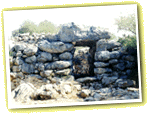
|
| A "Talaiot," which is a prehistoric council chamber near the settlement of Oleza.
|
The Romans called them the Iberians, the ancient race that first inhabited
this 1400 square-mile island off the coast of Spain some seven thousand
years ago. Today, Mallorca and its sister islands, Minorca and Ibiza, are
collectively known as the Balearics, a name derived from the Greek, balein,
meaning to hurl from a sling, a deadly skill for which these
islanders became known throughout the ancient world.
But when they weren't defending their home against invaders, Mallorca's
earliest inhabitants were busy farming and raising goats and cattle in the
rugged hills of this mountainous island, in much the same way that many
landowners still do today.
Though these ancient people left no written record, their legacy of pottery
and massive stone temples and living complexes has provided archaeologists
with enough evidence to piece together what life must have been like here
during the Copper Age, more than 2000 years before the birth of Christ.
Waldren: Okay, this is the prehistoric sanctuary of Son Mas, a site which
covers two thousand, two hundred years of ritual activity.
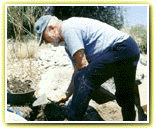
|
|
Dr. Bill Waldren, doing what he does best.
|
Dr. Bill Waldren of Oxford University has been excavating prehistoric sites
throughout the Balearic islands for more than thirty years. A gruff and
garrulous Hemingway look-alike, the seventy-four year old Waldren ended up
on Mallorca in the early sixties as an archaeologist's assistant. The
climate and the profession appealed to him and through a combination of
intuition, determination and just plain luck, he made several important
discoveries which led to grants from the Smithsonian, National Geographic
and others.
Waldren: This was the first site we excavated, and the
first site we were working when I discovered the old settlement. All that
material that you see there, all those rocks and that earth that you see
there is all stuff that was excavated by Earthwatchers.
In 1974 Waldren welcomed his first group of volunteers from a fledgling
organization later known as Earthwatch. Since that time he says he could
never have accomplished all he has...including a Ph.D. from and faculty
appointment at Oxford...without the elbow grease of thousands of
Earthwatchers over the years.
Waldren: Oh my God, just in the sheer labor alone -- everything that we
have done here in the past twenty-three years is really basically an
Earthwatch legacy.
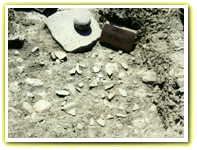
|
|
A 'spread' of ancient pottery. Grindstone in rear.
|
Waldren's work on Mallorca is just one of more than 130 projects in 50
countries around the globe sponsored in part by Earthwatch. There's really
something for everyone, from dinosaur digs in the American west to elephant
tracking in Botswana to saving the rain forests of Borneo. The way it works
is this: so-called volunteers pay anywhere from $650 to $3700, plus
airfare, to spend two weeks in some remote region of the planet working
alongside some of the world's leading researchers.
A good chunk of that fee, which, by the way, is tax deductible, goes to
Earthwatch to cover its administrative costs. Another chunk is donated to
the projects themselves while the rest pays for your room and board which
varies from site to site. Some Earthwatchers camp out in tents deep in the
bush with no electricity or running water. Others stay in makeshift field
station dormitories, while still others might end up in comfortable B &
B's or hotels.
On Mallorca, we stayed in Waldren's home...a multi-tiered, amorphous
stucco dwelling built into a hillside in Deia, a remote village on the
island's northwest coast. The setting is idyllic: groves of lemon and olive
trees cling to the terraced hillsides rising 3000 feet above the warm,
inviting turquoise waters of the Mediterranean. Fountains of purple morning
glories cascade over ancient stone walls, while sheep and donkeys graze
idley on vast fincas, estates that have been in the same aristocratic
families since the 13th century. It's easy to understand why this
particular project has been nicknamed the Club Med of Earthwatch expeditions
But of course we were there to work, and work we did, for about three hours
each morning in the field, using picks, trowels, brushes, and in some cases
dental tools in search of artifacts in the dry, crumbly earth.
Waldren: Excavation is basically nothing but good housekeeping, believe me.
So keep your trench neat. You've also got brushes, if you're in doubt at
any time and you wanna see what's in the next level before you dig into it,
you do this with it [he brushes].
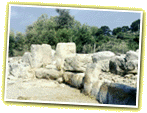
|
|
Ruins of the prehistoric temple of Son Mas.
|
We spent the first couple of days gathering soil samples at San Oleza, a
Copper Age settlement dating back to the 3rd century B.C. Waldren hopes to
use these samples to determine the location of a corral at the site, which
will help him learn more about the lifestyle of the people who lived here
four thousand years ago.
The rest of our stay we rummaged through the ruins of the temple of Son
Mas, an extremely prolific site where we dug up everything from prehistoric
pottery shards to Roman nails, coins and other treasures.
Waldren: Uh, you're gonna find little pieces of Roman glass, small pieces
of Roman glass, so keep your eyes open, for that.
We spent the afternoons sorting, weighing and scrubbing our booty beneath
the shade of beach umbrellas on a rooftop lab back at Waldren's house. This
was perhaps the dullest part of the day. Indiana Jones it ain't, but, as I
learned during Waldren's unavoidable "Everything you did or did not want to
know about a pottery sherd" lecture, you can actually tell quite a bit from
a busted water jug.
Waldren: The imported pottery is very interesting, because some of it comes
from different parts of the Mediterranean, meaning that they had trade in
here that came in from all directions -- as far away as the Black Sea, a long
way.
Some in our group were already familiar with such things as well as
Earthwatch. This was the second Earthwatch expedition for Wisconsin native
Dick Mason, an electrician by trade and archaeologist by hobby.
Mason: If you just read about archaeology, it's probably one of the most
boring things in the world, but to get your hands on it -- it's exciting if
you find stuff.
There were also a handful of secondary school teachers, like Mary Kay Natho
of Taunton, Massachusetts, who hoped to take what they learned in the field
back into the classroom.
Natho: I think it would be kind of neat to meter off certain areas and have
the kids sort of do their own little dig -- putting in different types of
artifacts that I might think of and have the kids come up with some
creative ideas about thinking about what early man was like.
Then, there were some high-spirited teenagers, like Lauren Bliss, whose
interests leaned more towards biology than archaeology.
Verde: If you had to sum up this trip -- what was the best thing about it?
Bliss: Spanish guys in general are hot, so that was great. There's one
that's really cute.
Whatever their individual motivations, Earthwatchers in general, says
Waldren, often share many common characteristics.
Waldren: They're normally educated people, they're sensitive people,
sensitive to their environment, they don't want to spend their time doing
something that's banal and meaningless like laying on a beach or something
like that, but they want to be able to contribute some way.
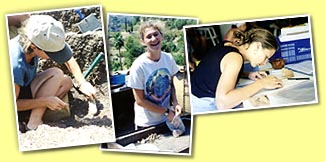
|
Left: Unearthing delicate artifacts at the temple of Son Mas.
Middle: Some laughs during lab time.
Right: Afterwards in the lab, documenting the morning's discoveries.
|
So, even if you've already been all that you can be and it's not the
toughest job you'll ever love, an Earthwatch expedition is bound to be one
of the most memorable vacations you'll ever have.
Off the coast of Spain on the island of Mallorca, I'm Tom Verde for the
Savvy Traveler
For more information:
For more information on Earthwatch and to get a look at their online
catalogue of expeditions, visit their web site at
http://www.earthwatch.org, or call or write them at:
Earthwatch Institute
680 Mt. Auburn Street
Box 9104, Watertown, MA 02471
PH: 617-926-8200
800-776-0188 (from U.S. & Canada)
FAX: 617-926-8532
For information on similar volunteer vacations/travel opportunities, visit Infoseek's Vacation Ideas site at
http://www3.infoseek.com/Sports/Travel/Vacation_ideas/. This Web site lists
all the major volunteer organizations. It also ranks them and provides
links to each.
Another source is Transitions Abroad, a publication that comes out every
two months. You can get a copy at a good newsstand or by calling 800
293-0373. They also publish a comprehensive guide to working abroad called
Work Abroad. A good part of the guide talks about volunteer vacations.
Transatlantic and domestic air transportation courtesy of Iberia Airlines.
For tickets, reservations and information contact 1-800-772 4642 or visit
their web page at www.iberia.com.
For information on Mallorca and visiting Spain, contact the Tourist office of Spain at 1-888-OK SPAIN or visit their web page at http://www.okspain.org.
Transportation on Mallorca courtesy of Auto Europe at
(800) 223-5555. Worldwide car rental services at competitive rates.
Excellent customer service.









